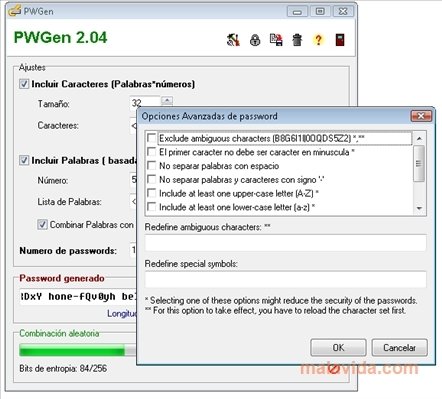

It generates such passwords that users can easily memorize.
#Pwgen terminal password
Generating a Random Password with ‘urandom’ Pwgen is another command-line utility that can be used to generate secure passwords. There are a few other creative ways to generate random text/password on linux terminal, but pwgen is specially designed for the task and is the most handy.
#Pwgen terminal how to
In this guide, we will see how to generate random passwords on Linux. pwgen is a useful command which can generate both pronounceable and secure passwords. generating random passwords with pwgen is easy, just run pwgen and it will generate a list of passwords for you.
#Pwgen terminal install
Let’s first install it sudo aptitude install pwgen. my goto tool to generate a random password is pwgen.

dragostea este jocul care este cu adevrat greu de câtigat. Now while making truly random passwords is easy if you have the right tools, remembering them is hard. Upper case letters and numeric digits are placed in a way that eases memorizing the password. These passwords contain either only lowercase letters, or upper and lower case, or upper case, lower case and numeric digits. The more random a password is, the stronger it will be. Reverso Context ofer traducere în context din român în francez pentru 'cu adevrat greu de', cu exemple: Iar. pwgen generates random, meaningless but pronounceable passwords. Random Mixture of lowercase and uppercase letters, numbers, and special characters.This ensures a strong protection wall against intruders.Īs per the policy of most security administrators, a strong password should have: As a security measure, every good security administrator always advises users to have a strong password that should be changed from time to time. The pwgen program generates passwords which are designed to be easily memorized by humans, while being as secure as possible. The pwgen utility helps you in generating strong and easily memorable passwords in seconds. Intruders and hackers use many sophisticated methods to hack a user’s account, bypass security mechanisms, enter an unauthorized section of a website, etc. Create up to 500 passwords - with letters, numbers and special characters, and a length of up to 60 characters.

As such, IT experts should know best practices and tools related to generating strong passwords.

Creating a secure and strong password is vital for securing our online assets. For example, you can add the following bash shell function to your ~/.Passwords are everywhere, whether it is online form filling, signing up for a service, securing documents, locking PCs, etc. Of course, there are many other ways to generate a strong password. We can also use the gpg tool to generate a strong 14 characters password: Use sha1 hash of given file as a (not so) random generatorĭon't print the generated passwords in columnsĭo not use any vowels so as to avoid accidental nasty words Among many other tools which can be used on the Linux command line to generate random passwords such as openssl, mktemp, od or /dev/urandom the specific and easiest tool designed for this purpose is pwgen. Include at least one special symbol in the passwordĭon't include ambiguous characters in the password
#Pwgen terminal manual
The program is designed to be used in a terminal via manual user input or via a. param1setformat refreshtrue terminalfalse.
Include at least one number in the password A simpel command line utility for generating passwords. /usr/bin/env phpInclude at least one capital letter in the passwordĭon't include capital letters in the password The option yTells pwgen that we are looking to generate a strong password andsTells you that it should include. You can also use some of the following flags: In the previous command we use two options. Once the installation is complete, use the following command to generate a random string of 14 characters: pwgen 14 1 mo GET YOUR VPS sudo apt-get install pwgen


 0 kommentar(er)
0 kommentar(er)
